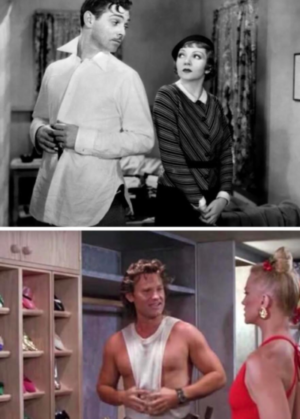Pulling the coveted sweep of the Oscars that is winning Best Picture, Best Director, Best Actress, Best Actor and Best Screenplay (Adapted), It Happened One Night focuses on a premise that would be revisited often in romantic cinematic conflict: the rich girl in need of a curt, working class man to soften her around the edges and make her see how spoiled she’s been all these years.
In Frank Capra’s 1934 classic, “brat” (as she’s come to be called by her love interest) Ellen Andrews (Claudette Colbert) is the daughter of a wealthy banker, Alexander (Walter Connolly), whose oppressiveness prompts her to regularly wreak havoc with her rebellion, including marrying a playboy type by the name of King Westley (Jameson Thomas) behind Daddy’s back. As a result, she finds herself sequestered on the Andrews yacht with her father holding her captive as he informs her that he has taken measures to have the marriage annulled. Similarly, Joanna Stayton (Goldie Hawn) in Garry Marshall’s Overboard is more literally trapped on her family’s yacht, as she and her husband, Grant (Edward Herrmann, pre-grandfather to Rory Gilmore), wait for the boat to be repaired while marooned in Elk Cove, Oregon. To pass the time, Joanna hires a carpenter named Dean Proffitt (Kurt–speaking to that “curt” adjective from before–Russell) to redesign her closet. The dynamic of their relationship is quickly established when Dean makes it clear that he, unlike most of her “help,” won’t stand for her smug, entitled attitude. Joanna, in turn, throws him overboard, foreshadowing her own fall off the boat soon after when she goes to get her wedding ring, which she, fortuitously, left behind on the deck before.
Ellen’s jump is, on the other hand, very intentional, as her father drives her to saddened rage after slapping her across the face, prompting her to finally take the action she’s been threatening. Taking the bus from Miami to New York, Ellen encounters a down on his luck reporter, Peter Warne (Clark Gable), who treats her with just the sort of contempt a girl, especially a rich girl, thrives on. The two are ultimately forced to sit together, paving the way for a little “getting to know you” opportunity. On their stop in Jacksonville, Peter discovers her true identity and waits for her in the depot to realize she’s stranded, knowing that she will assume–thanks to her many years of always being doted on–that the bus won’t leave without her.
When Ellen begs him not to tell her father and that she’ll pay him any amount he wants, Peter cuts her off with, “Never mind. I had you pegged right from the jump. Just the spoiled brat of a rich father. The only way you get anything is to buy it. You’re in a jam and all you can think of is your money. It never fails, does it? Ever hear of the word ‘humility’?” This, in essence, is what Dean is saying as well–though he doesn’t quite possess the eloquence to verbalize it so much as show it by going to collect Joanna at the hospital, capitalize on her amnesia by telling her she’s Annie, his wife of thirteen years, and then turning her into an indentured servant by making her take care of his four unruly sons. Like freezing to death, it’s awful at first, but then becomes rather pleasant.
The same goes for Ellen as she slums it in shoddy hotels with Peter (allowing for plenty of very scandalous skin-bearing for a film of the 30s) and quickly grows dependent on his innovative foraging ways, eventually having a near meltdown when she turns around while lying in some hay to find that he’s (momentarily) disappeared. The airs she puts on about being independent and not needing anyone–least of all some common man–to assist her in her aims can no longer be believed, least of all by the audience, long conditioned by cinema (especially by the time Overboard was released in 1987) to believe that even women with power (by virtue of having money) can’t fend for themselves in this world without some “street smart” guy to hold her by her dainty, jewel-adorned hand.
In truth, it takes a rough-talking, plebeian male with the gruff sense of force to make an overly pampered, self-aggrandizing woman see that she ought to get down to his level, join him in his coarse, pedestrian existence. It should be noted, of course, that the roles are never reversed. A poor girl never meets a rich boy and thinks: I’ve got to make him see that he’s living a sham and should come join me down at heel with the rest of the nobodies.
The undercutting message behind these two films is an alarming one that is only very slowly starting to be dismantled in modern film (Wonder Woman, Atomic Blonde, etc.–though both of these examples also offer a doltish man as part of the heroine’s distraction amid the crux of the narrative). Yes, the parallels between It Happened One Night and Overboard speak to the persistent societal need to insist that no matter how puissant a woman is, she still needs a man. Otherwise, she will remain immutably as a stuck up bitch in need of a spanking.





















